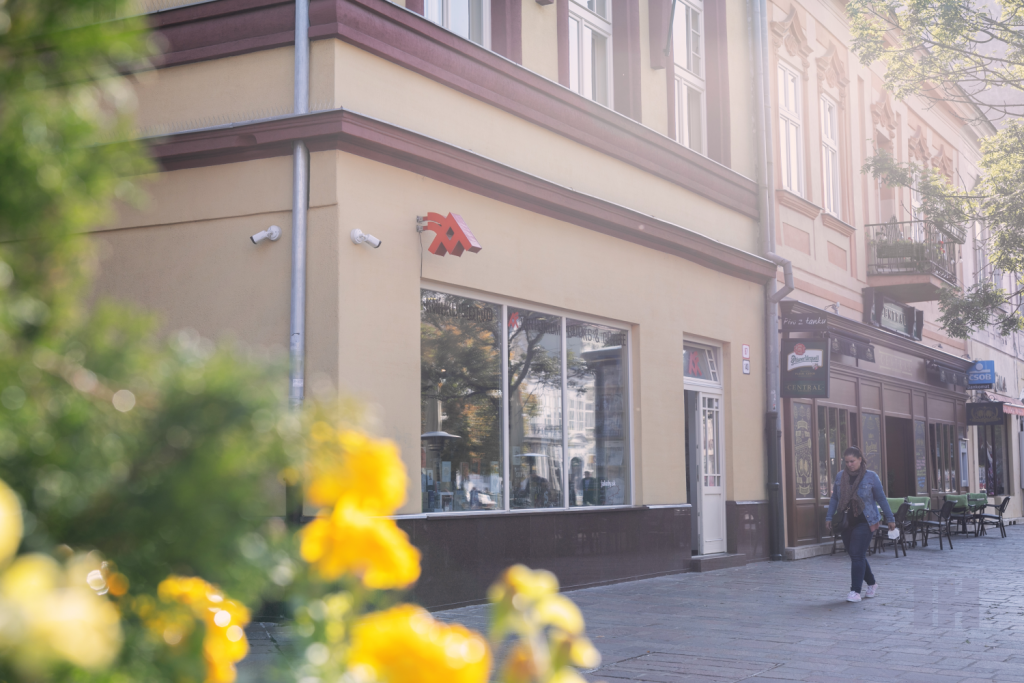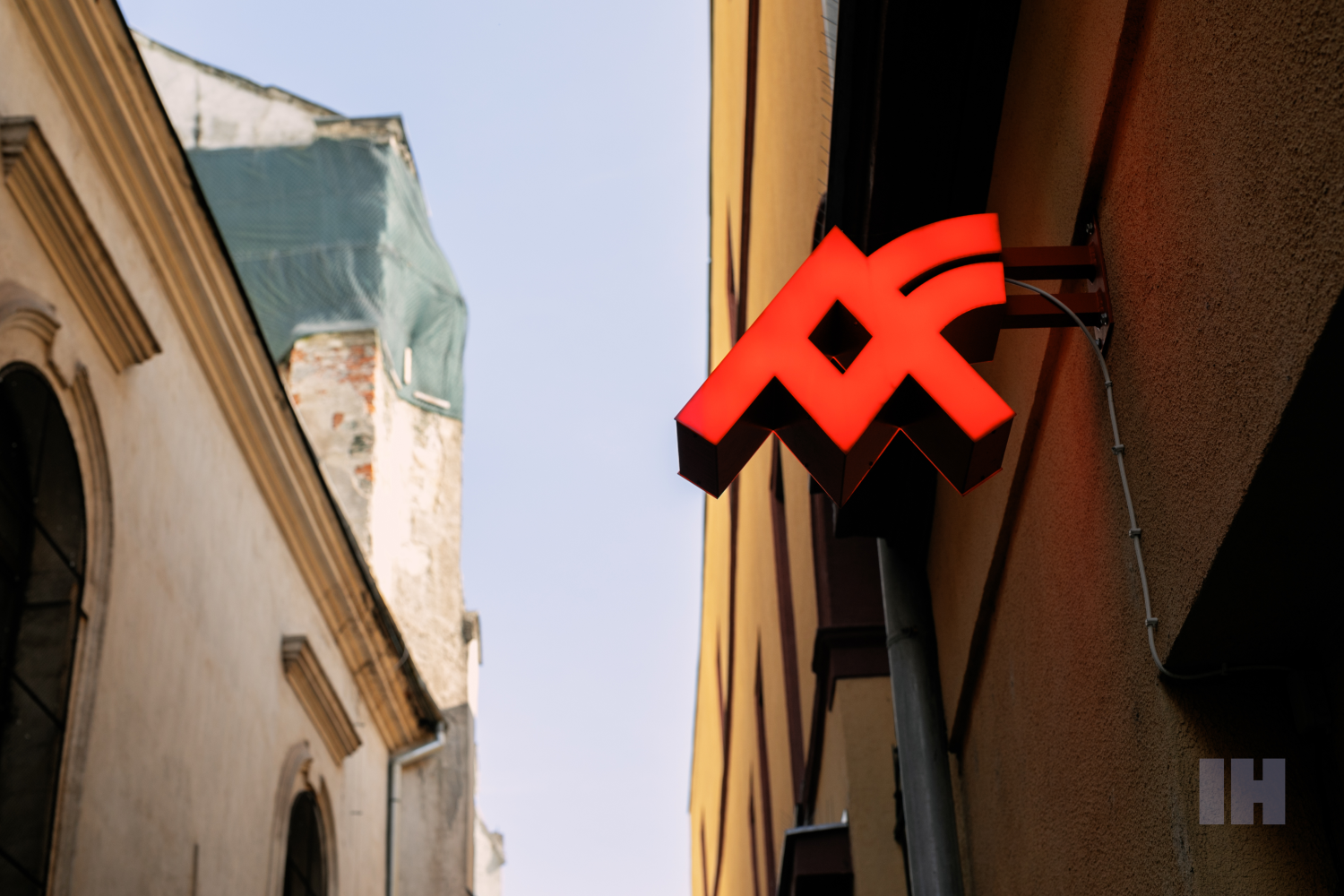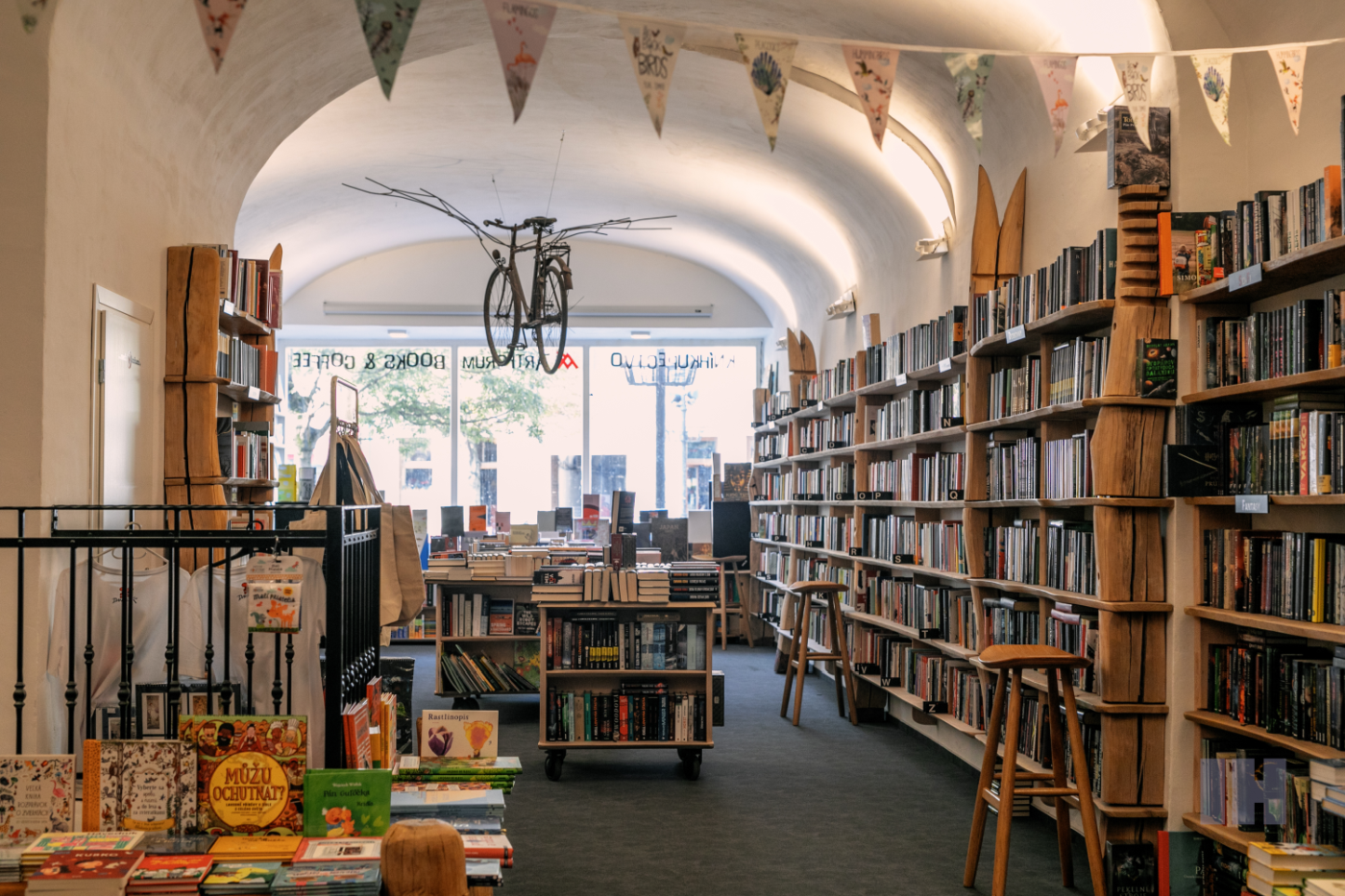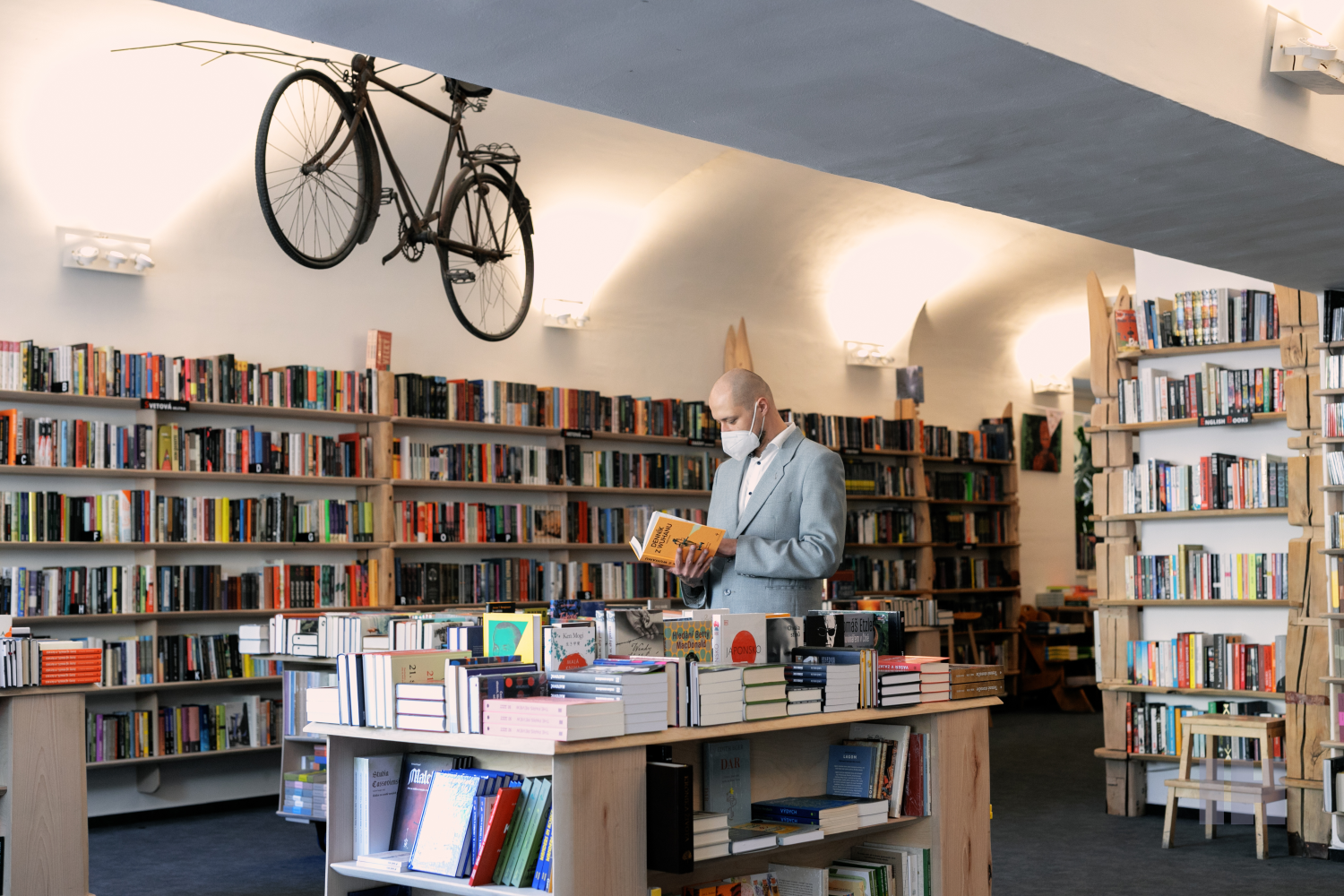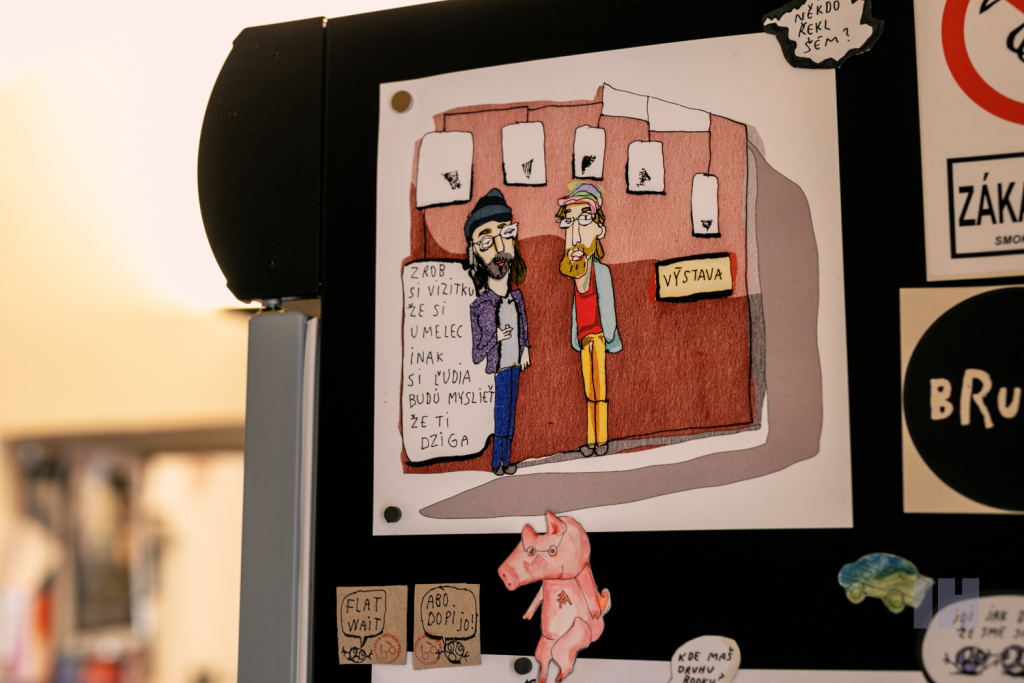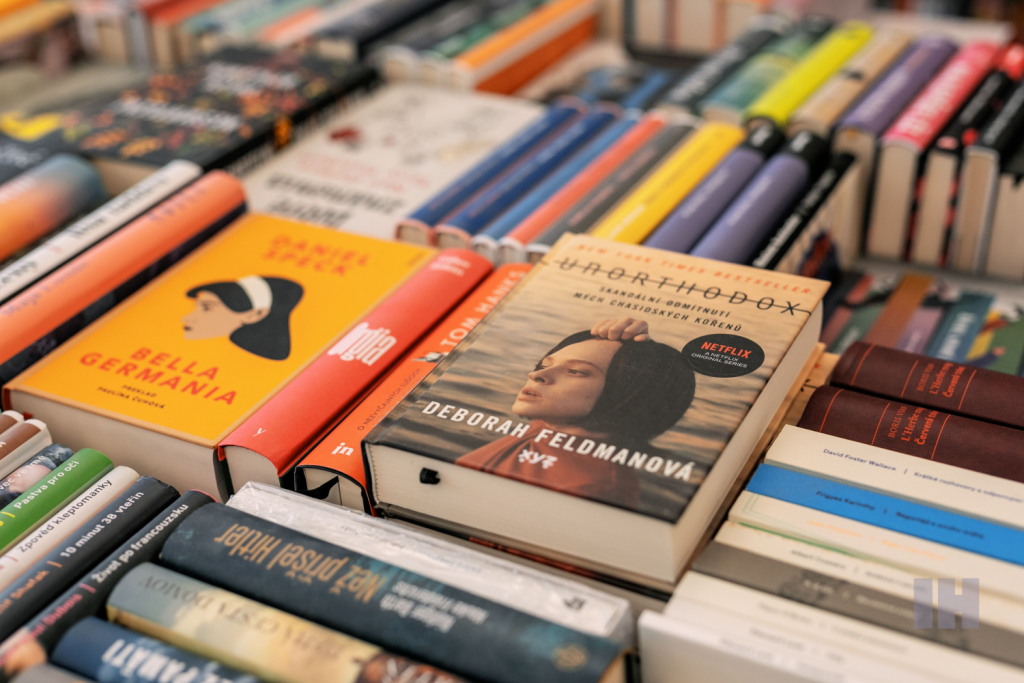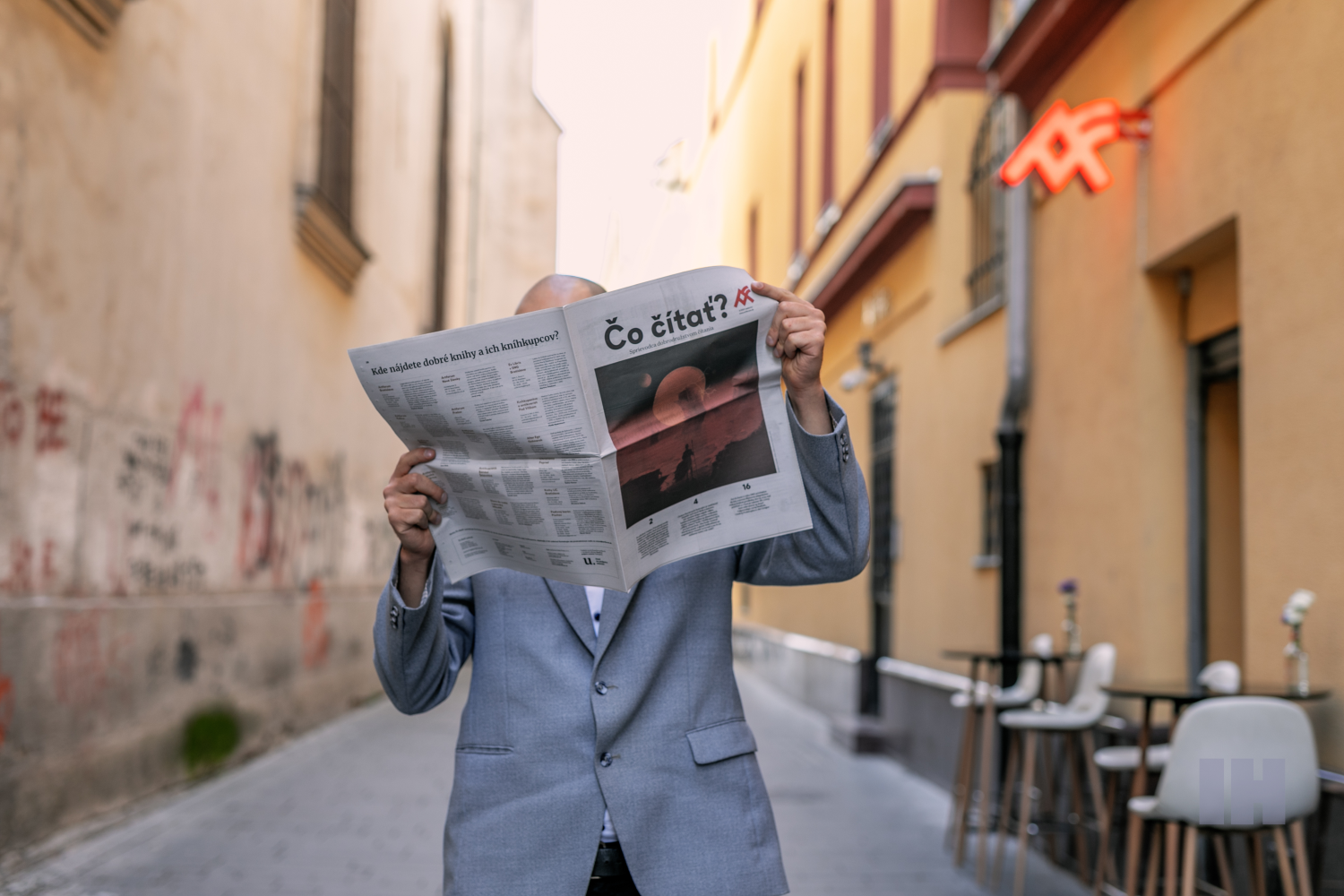In case you lack something, create it!
We talked about the Punktík festival, meeting with authors, the 90s, or the life of a bookstore during the Corona crisis with Karol & Mates from Košice’s Artforum.
Many streets resemble Italy in Košice. High café chairs, nice chilled air, where you can get a coffee or a wine even during the pandemics, and thus feel free. However, the aisle next to Artforum is unique in some way because you can always meet not only the “coolest” youngsters but also writers, artists, or other artists from Slovakia or abroad. In this aisle, while drinking a morning coffee, we interviewed Karol Volemann and Mates Farkašovský, who shared a story of a legendary bookstore with us.
We were beginning as a Czech underground bookstore in Košice, and this legend spread quickly
Mates:
As there were primarily priests and teachers in our family, I also wanted to become a teacher. I studied Civic Education and PE in Prešov during the 90s. It was a kalokagathia because you need to have harmony between body and soul (laughter).
At the station, I met Karol and Papek, by chance, who had decided to open the Artforum bookstore because nothing like that existed at that time. I promised to come and help if they needed it, and that’s how I started to get involved. Every week new books arrived that we needed to unpack, and of course, we talked about them. Books have always been a part of my life. My mum was active in literary clubs even during socialism; that’s why I have always had access to them.
So a bookstore was opened in Košice, and when I finished the university, I started to work there. Gradually we got to know interesting people who were active in culture. The Czech center helped us a lot. Actually, Košice was closer to Prague than to Bratislava. Czech underground naturally spread that somewhere in the East there is an unusual and amusing bookstore, that is worth a visit and people whom we invited usually accepted our invitations. We talk about names from Erazim Kohák to Plastikov. Kohák, the professor emeritus at universities in America and Prague, complimented us that we have a better philosophical section of books than people in Prague, and this praise started to spread. A legendary Vé club, where we knew people, was another critical contact for us. We began to share contacts for artists and bands with them. We had a feeling nothing happened in Košice, so we decided to start organizing it. If you want to attend some event, you need to organize it. That is how it worked in the 90s.
Karol:
We opened up in October 1994. We had planned it on the day of the anniversary of the founding of Czechoslovakia, and Marián Varga played during the opening ceremony. Artforum was probably the only “normal” bookstore in the Košice’s center. Of course, besides Alterna. But it was too hidden and too punk. It only functioned in a small apartment on Roosevelt street. We were in a real commercial space. Artists from Košice helped us to open it. We lived in Erik Groch’s apartment and later on under his apartment. We also got introduced to people around Marcel Strýko through Kembridž, but unfortunately, he already wasn’t very active at that time. It all felt like underground and art.
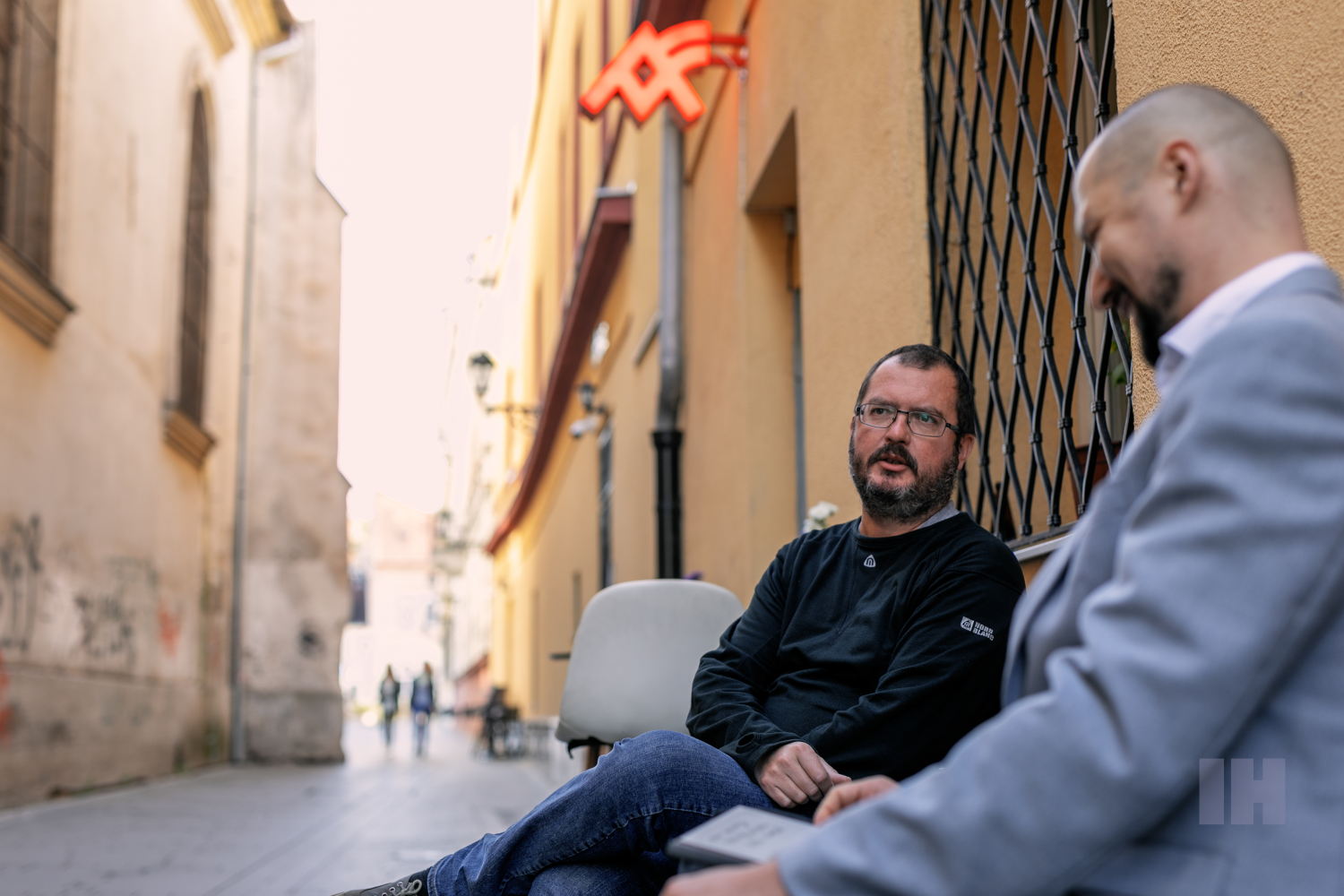
Since no clubs existed at that time, except Excenture (which was not aimed for live music but served as a small DJ club), some more significant underground events were up to us to organize. Every year, instead of going on holiday, we organized concerts going into debt. First it was Psí Vojáci in Barca, then Australian-Amercan band Fatal Shore, later on Dunaj. And eventually Plastic People of the Universe with Mejl Hlavsa in 1998.
In the beginning, we didn’t identify with the local culture much. Even though we used to get support from the unofficial groups and met with them, it was more artists than writers or bands. As a new bookstore, we didn’t have enough books, and that’s why one of the rooms in Artforum worked as a gallery. But it started to get out of our control. Jealous artists didn’t like each other very much. Everyone was saying they are the greatest artists and the others are the worst ones. They started to interfere in our dramaturgy, in which we didn’t have much experience. Since the amount of literature began to increase, the gallery got smaller, and currently, it is only art by Bandy that remained. This way, no one can argue anymore.
Even though Košice is the second biggest city in Slovakia, we missed space to relax, so we started to organize events. Well, we did it primarily for ourselves, but at the same time, we wanted to fulfill the legend that we are a Czech underground bookstore. Except for occasional concerts, we also organized author’s evenings and book presentations. Bondy was also present for a while, but he didn’t talk much, as he was already in decline. But there were also evenings with Juraj Krchovský, or Vlado Sivák from University of Presov. He had a series of talks which were, however, sometimes too long and incomprehensible for us, ordinary people. Later on, we invited many different authors. Lately, there was Mišo Hvorecký who mentioned that he has been coming to our place for 20 years with his every new book. Step by step, we started to discover a literary world of the Eastern part of Slovakia, or maybe it began to reveal to us. Currently, we try to pay more attention to local authors and their pieces.
Artforum is a space of freedom, presentation of not only books but also interesting artists, and, of course, a bit of rebellion as well!
Karol:
In consideration of other Artforums, we are more untied and anarchical. Somewhere they are focused on literature and books solely, which is not bad as well.
We have always considered Artforum a place where you can organize many different, a little bit provocative, events on an art basis, which surprise and shock in public space. We focused on displays in shop windows, where we provoked political power or used it for protests, not to mention they also served as a gallery. Also, Chiki Lili Tu-a played there as a part of the protest against the Ministry of culture, which didn’t care about the live culture at one moment. Chiki put this idea together with Kolowrat, and thanks to Peťo Radkoff’s initiative, they used our shop window, a public space in the city center, to make the event more visible.
Books are an inseparable part of Artforum; we live from them economically, and they consume our working time. Besides that, we try to connect people who either think forward or think differently from most of society. People who try to understand trends or deviate in their cultural production can therefore not find support in institutions since they are more or less invisible to them. We aim to be a platform for creators, artists, and such individuals. Amazingly, it’s not only us anymore, and there are many cultural centers, galleries, or similar communities.
Mates:
Artforum is a feeling I had during my time at university in Bratislava during the revolution. It was soon after that when the bookstore was opened. Many incredible books started to be released, and we only suspected they existed, but we never held them in our hands. I was watching Red Army twice a week and was in awe of it. I want to bring alive the feeling of how excited I was back then when I was eighteen or nineteen, even now—the spirit of all new books.
I think this is the reason it lasts. Because we still do it a bit rebelliously, as we used to. It got under my skin; it is how I feel it and want to do it.
We always did a bit of rebellion. In the 90s, it was against Mečiarism when we put the books about Mečiar upside down in our shop window. Old ladies – democrats used to come in and lecture us to put it away immediately.
I think the world should be as you imagine it. But you can’t only wait; you need to do it! Create it! If you lack something and you need it for your living, go and create it.
Karol:
I have never seen a concept that would resemble our one. On one side, it is a combination of anarchy and subversive behavior against bureaucracy or rules we consider meaningless. On the other side, it is very polite behavior to customers who pay in the shop. Plus the quality product, be it books or coffee which smell is now an inseparable part of the sale. It is something unique we were able to build together with customers. In the end, they tell us what they want, and we try to adjust their ideas so that it is not total jackassery. It is a mutual search for limitations and borders and, at the same time, broadening them.
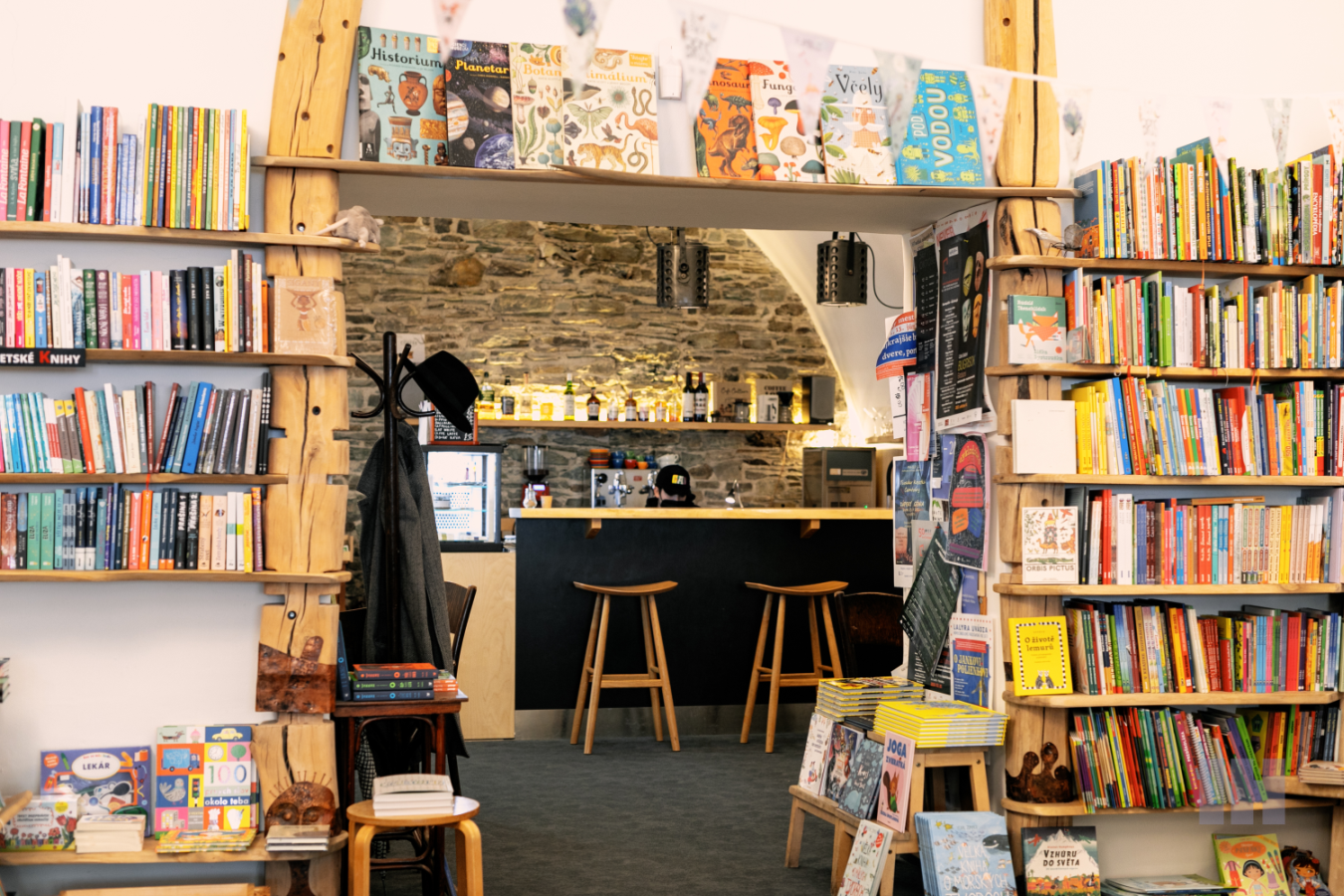
The more you know the authors, the more information you get from them. For us, it is crucial that writers feel good at our place, even if we don’t agree all the time completely
Mates:
You know the authors, the publishers, you dig into released books daily, but we still choose intuitively. After 26 years of experience, we can guess what will be worth.
Our bookstore concept is based on the good feeling you have in it. When you look inside, it seems almost like a living room. When talking about authors, it is always good if you know them personally. When people feel at home, they are more open and relaxed, and you can get more information from them. If you are fake, impersonal, it is useless. Well, go to the post office to see the difference.
Karol:
People who naturally incline to us are the ones whom we like to present. It is a mutual closeness. We try to ignore people who only want to rent our space. It is not our style. This space is ours, and we decide whom we want to sell and support when we invite him to do a presentation. It needs to be a person whose product is attractive on both a craft and aesthetical level. At the same time, it should be a communicative person since it is a live encounter with readers. It is also how we choose moderators. We try to think about the authors’ personalities and pick a moderator who can lead them through the discussion. Often we ask the writers for their preferences. People are always more relaxed and feel like sharing with someone similar.
Mates:
Everything was online during the lockdown. We all were wearing facemasks, even moderators. We are responsible and therefore check the COVID passes to our customers. I feel that educated people are more responsible and thanks to that we have never had to send anyone away because of the absence of a covid pass or complete vaccination.
We also invite inspirational people who can show something and shift your thinking for our reading sessions. It was for example Vladimír Palko. I was fascinated that he arrived by train and then left back to Bratislava by train in the evening. We could argue with him quite constructively. Even though I don’t share his view on life, we thought that a debate with an orthodox Christian could move us forward. On the other side, there was also a theater with homeless people of Uršula Kovalyk.
The new space is so good that one can do anything here – reading sessions, theatre, concert. The atmosphere itself is exciting when it’s happening. That is the reason we do it!
We try to come with books and goulash to all festivals we think are worth it, but we also organize Punktík, Children’s Book Festival, which is our child
Karol:
Punktík is a festival which is organized by us exclusively. It is a children’s book festival we have organized for four years already. We try to show kids and their parents the importance of mutual experiencing stories not only through the books but other media as well. It is mostly about live interaction, which is very diverse since you cannot only arrange a discussion with an author for kids, it would be boring for them. We try to mix theatre, workshops, music into one day in the space of Tabačka, which is ideal because of all the nooks, and kids never get bored in it. We plan to organize Punktík every year.
But there are also other festivals which we co-organize with Kino Úsmev or Tabačka. Similarly, we organize festivals LiKE or Night of Literature, even though they were only online for the last two years.
There is one more concept that belongs to festivals for us, and that’s goulash. Well, during the festival it is important to eat, not only drink (laughter). Many interesting conversations emerge while eating goulash, and often, people who would usually never get to books notice our bookstall just thanks to it. We have a feeling we can lure them this way (laughter). Moreover, I don’t feel like only standing next to books during the festivals, I need some side activity, and that’s how I got to this funny thing.
Nowadays, it is different than in the 90s when we felt pretty alone. It was only us in Artforum and Peťo Radkoff with his project. But today it is better. Be it small galleries like Šopa Gallery, we cooperated recently and introduced their first book – monography of local visual artist Svetlana Fialová. Or VUNU Gallery, which does its events beyond the space of the gallery. We have excellent cooperation with the East Slovak Gallery. In the bar Pokhoi, we organized a book bazaar with goulash for many years. Now we don’t organize concerts outside of Artforum anymore. Sometimes we have a feeling that a particular event fits perfectly with us. It is a project Poeti Elektrik as an example, which wouldn’t have the same atmosphere anywhere else but here among the books.
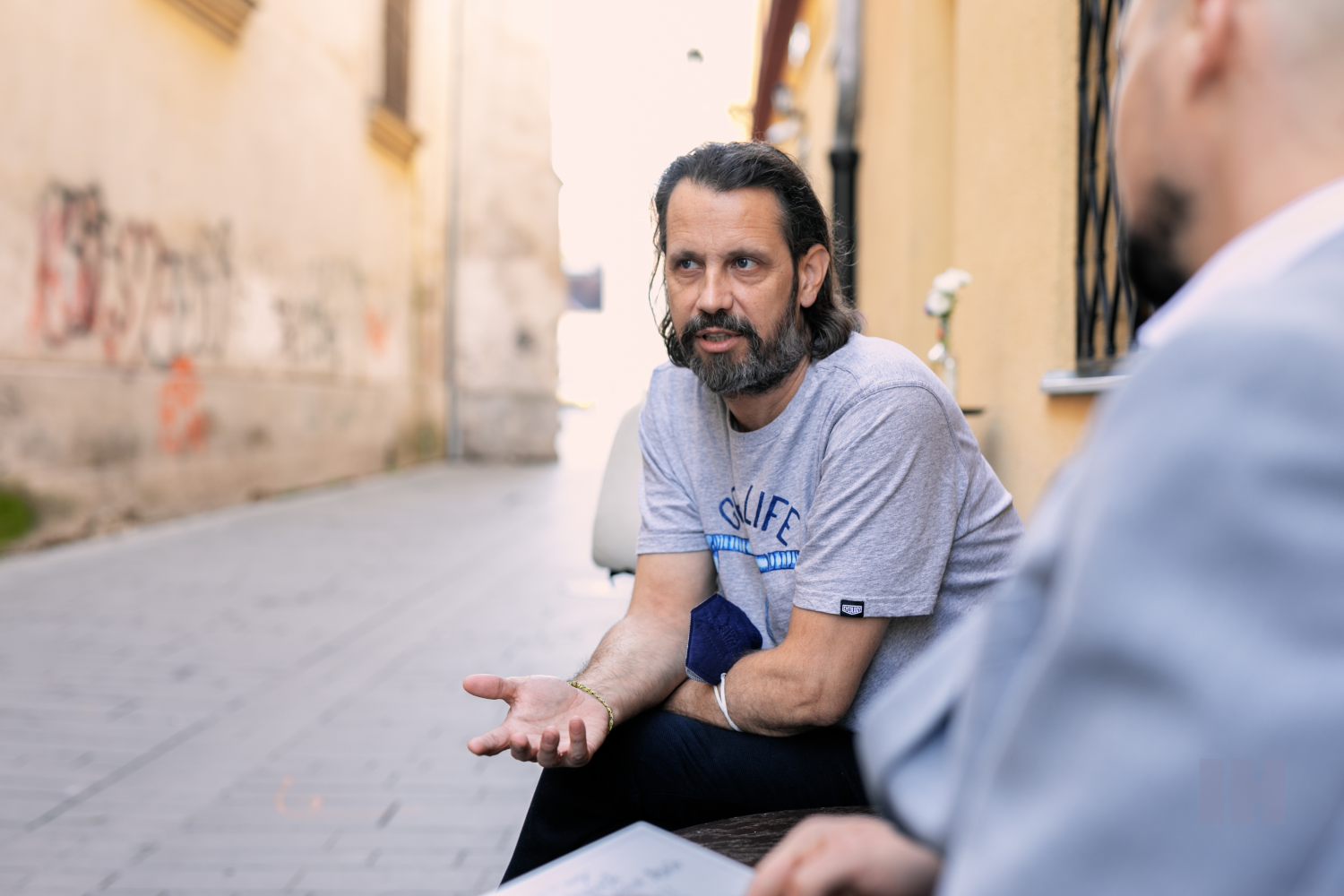
Mates:
Our work aims to deliver books even to someone’s home. Because only thanks to education can we move forward. When we feel that there should be books somewhere, we bring them there. Besides that, we really enjoy festivals as well. It is interconnected – a bit of work and a bit of fun.
Regarding Punktík, we had found out that there was no children’s book festival in Slovakia. We tried to organize it ourselves under the motto “If something is missing, create it.” There is a wide variety of audiences coming to the festival – authors, publishers of children’s books and magazines… If those people are worth it, you want to have them present.
There is always a fundamental question: “What is the way you want to have it?” The answer is: “I want it to be entertaining for me, my kids, for the other kids.” So you think of the program for people have that wow moment, we need to come here again. It is as simple as that.
We survived Corona
Mates:
Corona’s times were hard, but we managed it somehow. We had to take a loan, of course not from the state. If we waited for its help, maybe we wouldn’t survive. Thanks to that loan, we overcame the most challenging times, and now we are repaying it. Hopefully, it will be over soon. I hope we won’t have to take another one (laughter).
I believe it will be better since we have a chance to get a vaccine currently. I don’t think it’s a medicine, but it is a possibility to slow down the pandemic a bit.
Our customers are regular and, let’s say, book addicts, which is fantastic. We even told our kids to deliver books on a bike directly to their houses during the pandemics. It was like reassuring: Rely on us, we are here, and we will survive this.
Karol:
During the whole existence of Artforum, there were many threats to this project. At this moment, it is good to mention that Artforum Košice is in full ownership of us, people who create Artforum in Košice. Even moving on into Main street was done by us. The relationship we have with the owner of the building is correct. It is a person who understands art and also understands our mission. Together we were able to overcome the time when we had to be closed. Currently, we don’t expect any hard lockdown, but last year’s situation impacted the live events primarily. We did them through online broadcasting, but it also had its limits. You cannot compensate for live contact, and people usually want to see the author in a real three-dimension world. They want to sense and feel everything around them. We could use the online world for some moments, but we don’t even think about doing online presentations in the future. The priority for us is to have live sessions. We see it optimistically with the live concept as long as we have a will to do it. If authors are willing, most of the population is vaccinated or follows the covid measures; the live concept can be real. It is essential for us that we live with books and our customers daily. You cannot retain the relationship through ZOOM or any shared connection. We do the pre-selection of what our customers can find on our counters, we can defend our choices, and in some way, we can also do the pre-selection for a specific person. Most of our customers come back and visit us regularly. The essence of our purpose is meeting with people, and the store is only the second part of it. Thanks to the store, it is all possible.
With our first publication, we paid off the debt to Košice’s prominent figure
Mates:
Jakoby is, for us, the most outstanding artist from Košice. Besides Mária Bartuszová, about whom a publication is to be released, we should cooperate as the exclusive distributors.
Bandy said it nicely that we had decided to pay off the debt since Jakoby, our prominent figure of Košice, hadn’t had a proper publication until these days.
Daniel Liška, the expert on Jakoby’s art, appeared, and we started to discuss that it would be nice to publish the book. We managed to do it in three to four years.
Karol :
It is also great that the Conservative Institute awarded the work of our editor Daniel Liška with the Dominik Tatarka Award. The laureates of the award Alta Vášová and Milan Šútovec gave a lovely speech about Daniel’s work, Jakoby’s contribution, and understanding the artistic atmosphere of 20th century in Košice. We are glad our publishing activity received excellent feedback even in these circles. It is a pleasing feeling of satisfaction for everyone who worked on the book, whether it is Daniel Liška, Katarína Rybnická, or Boris Vaitovič. They did a fantastic job.
